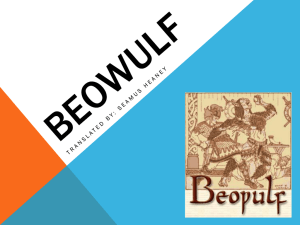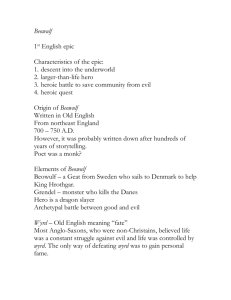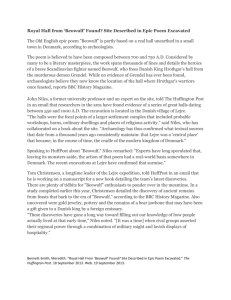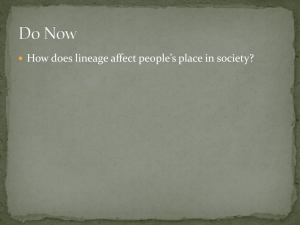Assesment sheet of Beowulf- Ron Chen.doc
advertisement
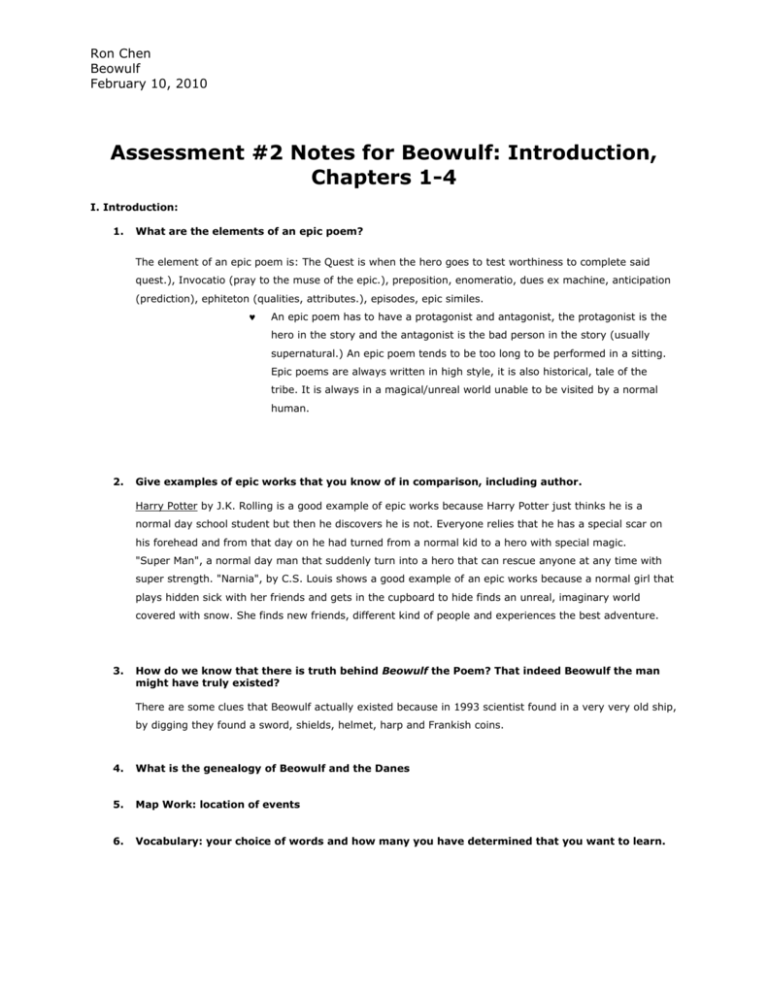
Ron Chen Beowulf February 10, 2010 Assessment #2 Notes for Beowulf: Introduction, Chapters 1-4 I. Introduction: 1. What are the elements of an epic poem? The element of an epic poem is: The Quest is when the hero goes to test worthiness to complete said quest.), Invocatio (pray to the muse of the epic.), preposition, enomeratio, dues ex machine, anticipation (prediction), ephiteton (qualities, attributes.), episodes, epic similes. An epic poem has to have a protagonist and antagonist, the protagonist is the hero in the story and the antagonist is the bad person in the story (usually supernatural.) An epic poem tends to be too long to be performed in a sitting. Epic poems are always written in high style, it is also historical, tale of the tribe. It is always in a magical/unreal world unable to be visited by a normal human. 2. Give examples of epic works that you know of in comparison, including author. Harry Potter by J.K. Rolling is a good example of epic works because Harry Potter just thinks he is a normal day school student but then he discovers he is not. Everyone relies that he has a special scar on his forehead and from that day on he had turned from a normal kid to a hero with special magic. "Super Man", a normal day man that suddenly turn into a hero that can rescue anyone at any time with super strength. "Narnia", by C.S. Louis shows a good example of an epic works because a normal girl that plays hidden sick with her friends and gets in the cupboard to hide finds an unreal, imaginary world covered with snow. She finds new friends, different kind of people and experiences the best adventure. 3. How do we know that there is truth behind Beowulf the Poem? That indeed Beowulf the man might have truly existed? There are some clues that Beowulf actually existed because in 1993 scientist found in a very very old ship, by digging they found a sword, shields, helmet, harp and Frankish coins. 4. What is the genealogy of Beowulf and the Danes 5. Map Work: location of events 6. Vocabulary: your choice of words and how many you have determined that you want to learn. 7. What are the themes of Beowulf? Fortitude and wisdom Glory and treasure Wyrd (fate) and providence Loyalty, vengeance, and feud Evil and the monsters II. Chapter One> Add page numbers, giving evidence to support your ideas. 1. Characteristics of Beowulf: 2. Moral values of Beowulf. What did his character prove about what he believed in? 3. Why did Beowulf want to risk his life to rid another tribe from terror? 4. How did Beowulf hear about the terror of Hrothgar’s Hall? 5. What are Grendel’s reasons for killing so many thanes? For haunting Hrothgar’s Hall as he does? III. Chapter Two> Add page numbers, giving evidence to support your ideas. 1. 2. 3. Description of Hrothgar’s Hall, and why it was named as such. Beowulf’s thanes: why were they so loyal to him? Similes: Horse/Boat; Men in Armor/Snake. Why are they compared to one another? How? IV. Chapter Three> Add Page numbers where you can, giving evidence to support your ideas. 1. Argument between the Jester, and Beowulf. What was the significance of it? What did it reveal about Beowulf’s character? What did it reveal about the Jester’s Character? What is the Jester’s name, and what is his significance to the Danish King? 2. Give yet another description of Beowulf. Are you convinced that he can fight Grendel and win because of said description? Why or why not? V. Chapter Four> Add page numbers, giving evidence to support your ideas. 1. Grendel’s nightly habits and description of him. What other names are used to describe Grendel? What do they all have in common? What idea? Grendel has many names to describe him like the death shadow, monstrous, evil, the night stalker, troll skin, all these names are the best description to describe Grendel because they are all very truly described and all the names have the idea of the monster because when someone says you have a troll skin or you are a night stalker or you are the death shadow that means you are a monster. Grendel also hates seeing people happy and enjoying them self so he comes and ruins it all. 2. The fight between Beowulf and Grendel: what happened that was thought never to have happen? At what sacrifice? Beowulf had won the fight and got Grendel frightened and made him ran away which never had happen before. 3. Grendel’s thoughts throughout his fight? What kind of affect did these thoughts have on Grendel? 4. What did Grendel’s arm symbolize to the Danes? peace Victory triumph




